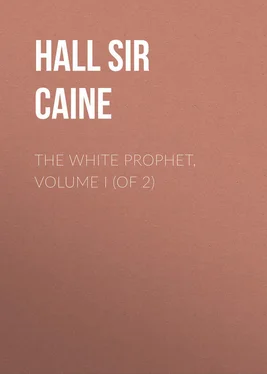Hall Caine - The White Prophet, Volume I (of 2)
Здесь есть возможность читать онлайн «Hall Caine - The White Prophet, Volume I (of 2)» — ознакомительный отрывок электронной книги совершенно бесплатно, а после прочтения отрывка купить полную версию. В некоторых случаях можно слушать аудио, скачать через торрент в формате fb2 и присутствует краткое содержание. Жанр: foreign_antique, foreign_prose, на английском языке. Описание произведения, (предисловие) а так же отзывы посетителей доступны на портале библиотеки ЛибКат.
- Название:The White Prophet, Volume I (of 2)
- Автор:
- Жанр:
- Год:неизвестен
- ISBN:нет данных
- Рейтинг книги:5 / 5. Голосов: 1
-
Избранное:Добавить в избранное
- Отзывы:
-
Ваша оценка:
- 100
- 1
- 2
- 3
- 4
- 5
The White Prophet, Volume I (of 2): краткое содержание, описание и аннотация
Предлагаем к чтению аннотацию, описание, краткое содержание или предисловие (зависит от того, что написал сам автор книги «The White Prophet, Volume I (of 2)»). Если вы не нашли необходимую информацию о книге — напишите в комментариях, мы постараемся отыскать её.
The White Prophet, Volume I (of 2) — читать онлайн ознакомительный отрывок
Ниже представлен текст книги, разбитый по страницам. Система сохранения места последней прочитанной страницы, позволяет с удобством читать онлайн бесплатно книгу «The White Prophet, Volume I (of 2)», без необходимости каждый раз заново искать на чём Вы остановились. Поставьте закладку, и сможете в любой момент перейти на страницу, на которой закончили чтение.
Интервал:
Закладка:
Sure enough, at the end of the first act the Khedive rose and retired to the saloon, and sure enough at the next moment the Consul-General was summoned to follow him. His Highness was very gracious, very agreeable, all trace of their last stormy interview being gone; and gradually Lord Nuneham drew him up to the windows overlooking the public square.
There, under the sparkling light of a dozen electric lamps, in a solid line surrounding the Opera House, stood a battalion of infantry, with the guns of the artillery facing outward at every corner; and at sight of them the Khedive caught his breath and said —
"What is the meaning of this, my lord?"
"Only a little attention to your Highness," said the Consul-General in a voice that was intended to be heard all over the room.
At that instant somebody came up hurriedly and whispered to the Khedive, who turned ashen white, ordered his carriage, and went home immediately.
Next morning at eleven, Lord Nuneham, with the same force drawn up in front of Abdeen Palace, went in to see the Khedive again.
"There's a train for Alexandria at twelve," he said, "and a steamer for Constantinople at five – your Highness will feel better for a little holiday in Europe!" and half-an-hour afterwards the Khedive, accompanied by several of his Court officials, was on his way to the railway station, with the escort, in addition to his own bodyguard, of a British regiment whose band was playing the Khedivial hymn.
He had got rid of the Khedive at a critical juncture, but he had still to deal with a sovereign that would not easily be chloroformed into silence. The Arabic press, to which he had been the first to give liberty, began to attack him openly, to vilify him, and systematically to misrepresent his actions, so that he who had been the great torch-bearer of light in a dark country saw himself called the Great Adventurer, the Tyrant, the Assassin, the worst Pharaoh Egypt had ever known – a Pharaoh surrounded by a kindergarten of false prophets, obsessed by preposterous fears of assassination and deluded by phantoms of fanaticism.
His subordinates told him that these hysterical tirades were inflaming the whole of Egypt; that their influence was in proportion to their violence; that the huge, untaught mass of the Egyptian people were listening to them; that there was not an ignorant fellah possessed of one ragged garment who did not go to the coffee-house at night to hear them read; that the lives of British officials were in peril; and that the promulgation of sedition must be stopped, or the British governance of the country could not go on.
A sombre fire shone in the Consul-General's eyes while he heard their prophecy, but he believed it all the same, and when he spoke contemptuously of incendiary articles as froth, and they answered that froth could be stained with blood, he told himself that if fools and ingrates spouting nonsense in Arabic could destroy whatever germs of civilisation he had implanted in Egypt, the doctrine of the liberty of the press was all moonshine.
And so, after sinister efforts to punish the whole people for the excesses of their journalists by enlarging the British army and making the country pay the expense, he found a means to pass a new press law, to promulgate it by help of the Prime Minister, now Regent in the Khedive's place, and to suppress every native newspaper in Egypt in one day. By that blow the Egyptians were staggered into silence, the British officials went about with stand-off manners and airs of conscious triumph, and Lord Nuneham himself, mistaking violence for power, thought he was master of Egypt once more.
But low, very low on the horizon a new planet now rose in the firmament. It was not the star of a Khedive jealous of Nuneham's power, nor of an Egyptian Minister chafing under the orders of his Under-Secretary, nor yet of a journalist vilifying England and flirting with France, but that of a simple Arab in turban and caftan, a swarthy son of the desert whose name no man had heard before, and it was rising over the dome of the mosque within whose sacred precincts neither the Consul-General nor his officials could intrude, and where the march of British soldiers could not be made. There a reverberation was being heard, a now voice was going forth, and it was echoing and re-echoing through the hushed chambers that were the heart of Islam.
When Lord Nuneham first asked about the Arab he was told that the man was one Ishmael Ameer, out of the Libyan Desert, a carpenter's son, and a fanatical, backward, unenlightened person of no consequence whatever; but with his sure eye for the political heavens, the Consul-General perceived that a planet of no common magnitude had appeared in the Egyptian firmament, and that it would avail him nothing to have suppressed the open sedition of the newspapers if he had only driven it underground, into the mosques, where it would be a hundredfold more dangerous..
If a political agitation was not to be turned into religious unrest, if fanaticism was not to conquer civilisation and a holy war to carry the country back to its old rotten condition of bankruptcy and barbarity, that man out of the Libyan Desert must be put down. But how and by whom? He himself was old – more than seventy years old – his best days were behind him, the road in front of him must be all downhill now; and when he looked around among the sycophants who said, "Yes, my lord," "Excellent, my lord," "The very thing, my lord," for some one to fight the powers of darkness that were arrayed against him, he saw none.
It was in this mood that he had gone to the sham fight, merely because he had to show himself in public; and there, sitting immediately in front of the fine girl who was to be his daughter soon, and feeling at one moment her quick breathing on his neck, he had been suddenly caught up by the spirit of her enthusiasm and had seen his son as he had never seen him before. Putting his glasses to his eyes he had watched him – he and (as it seemed) the girl together. Such courage, such fire, such resource, such insight, such foresight! It must be the finest brain and firmest character in Egypt, and it was his own flesh and blood, his own son Gordon!
Hitherto his attitude towards Gordon had been one of placid affection, compounded partly of selfishness, being proud that he was no fool and could forge along in his profession, and pleased to think of him as the next link in the chain of the family he was founding; but now everything was changed. The right man to put down sedition was the man at his right hand. He would save England against Egyptian aggression; he would save his father too, who was old and whose strength was spent, and perhaps – why not? – he would succeed him some day and carry on the traditions of his work in the conquests of civilisation and its triumph in the dark countries of the world.
For the first time for forty years a heavy and solitary tear dropped slowly down the Consul-General's cheek, now deeply scored with lines; but no one saw it, because few dared look into his face. The man who had never unburdened himself to a living soul wished to unburden himself at last, so he scribbled his note to Gordon and then stepped into the carriage that was to take him home.
Meantime he was aware that some fool had provoked a demonstration, but that troubled him hardly at all; and while the crackling cries of "Long live Egypt!" were following him down the arena he was being borne along as by invisible wings.
Thus the two aims in the great Proconsul's life had become one, and that one aim centred in his son.
CHAPTER V
As Gordon went into the British Agency a small, wizened man with a pock-marked face, wearing Oriental dress, came out. He was the Grand Cadi (Chief Judge) of the Mohammedan courts and representative of the Sultan of Turkey in Egypt, one who had secretly hated the Consul-General and raved against the English rule for years; and as he saluted obsequiously with his honeyed voice and smiled with his crafty eyes, it flashed upon Gordon – he did not know why – that just so must Caiaphas, the high priest, have looked when he came out of Pilate's judgment hall after saying, "If thou let this man go thou art not Cæsar's friend."
Читать дальшеИнтервал:
Закладка:
Похожие книги на «The White Prophet, Volume I (of 2)»
Представляем Вашему вниманию похожие книги на «The White Prophet, Volume I (of 2)» списком для выбора. Мы отобрали схожую по названию и смыслу литературу в надежде предоставить читателям больше вариантов отыскать новые, интересные, ещё непрочитанные произведения.
Обсуждение, отзывы о книге «The White Prophet, Volume I (of 2)» и просто собственные мнения читателей. Оставьте ваши комментарии, напишите, что Вы думаете о произведении, его смысле или главных героях. Укажите что конкретно понравилось, а что нет, и почему Вы так считаете.












